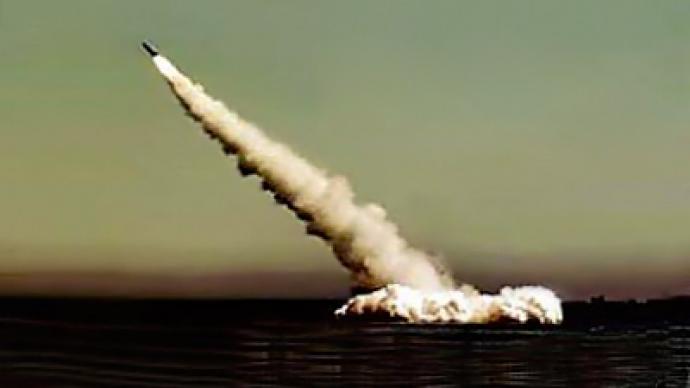Russian Defense Minister says newest ICBM ready for mass production

Russian Defense Minister Anatoly Serdyukov has said that the newest submarine-based ballistic missile Bulava has successfully been tested and is ready for mass production.
Speaking to journalists on Friday, Serdyukov said that the Bulava, which literally translates as “mace” (also designated by NATO as the SS-NX-30), was cured of all the bugs which had been uncovered during the initial test launches which were unsuccessful. “The Bulava has taken off – this is good news. We clearly understand that at this stage it is possible to start the mass production of the missile. We achieved this result – now we can load the Bulava into the Yuri Dolgorukiy submarine missile carrier,” the minister said.When a reporter asked Serdyukov if the Bulava missile might undergo further tests on the second of Russia’s newest nuclear ballistic missile submarines – the Aleksander Nevskiy – the minister did not give a direct answer, saying that he he hoped so but it is difficult to make exact plans. “We understand that it cannot be planned. A submarine is not a car,” the minister said.The minister was referring to the latest success coming from Russian missile engineers – on June 29 an official representative of the Defense Ministry told reporters that for the first time, the Bulava missile had been successfully launched from theYuri Dolgorukiy submarine while submerged, hitting all designated targets at the Kura range in Kamchatka, some 3700 miles to the east. The ministry also said that five more tests of the Bulava missile will take place before the end of 2011, and the navy would purchase the missiles as primary weapons in late 2011 or early 2012.The problem remained that of the 14 previous launches, only seven were successful or partially successful. The reasons behind the failures remain secret. However, in July 2009 the head of the design bureau that developed the missile resigned, saying that he felt personally responsible for the failures. Navy commanders said that the project would continue as Russia saw no alternatives to Bulava. Two years on and the designers efforts have paid off. Also, at a press conference held on Friday, Defense Minister Serdyukov reiterated the intention to organize Special Forces to protect the Russian Arctic. He said that such forces would be comprised of two army brigades and the General Staff is currently working on the plans to form these units. Serdyukov said that the work would be partially based on foreign countries’ experience in this sphere, in particular on the military forces of Finland, Norway and Sweden, which already have such units. The brigades could be based in Murmansk, Arkhangelsk or in some other place, the minister added. Russia is talking about boosting its military presence in the Arctic since initial reports appeared that global warming could seriously facilitate the development of the Arctic Ocean shelf. Prime Minister Vladimir Putin said the nation was resolute to increase its presence in the region. “We are open to dialogue with our foreign partners, with all of our neighbors in the Arctic region, but, of course, we will firmly and consistently defend our geopolitical interests,” Putin said.












